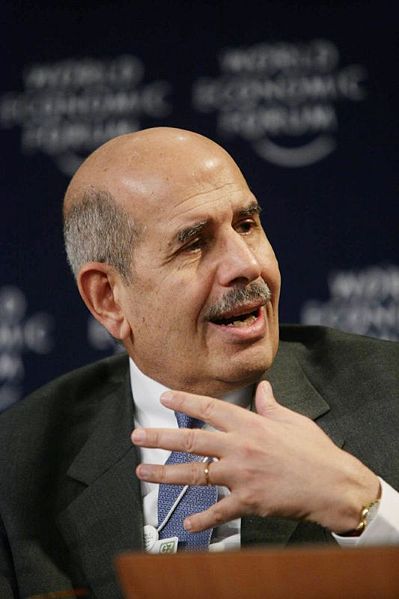
Mohamed ElBaredei in 2007 (Wikimedia Commons)
Conservative media has been running hard with various alarmist themes about the uprising in Egypt–the influence of Islamists, the potential threat to oil supplies, and the fact that former International Atomic Energy Agency chief Mohamed ElBaradei is the emerging face of the opposition in Cairo. (Jon Chait has a fun roundup of ElBaradei hysteria.)
While the likes of Glenn Beck and Sean Hannity may exaggerate them, not all these concerns are ridiculous. The latest reporting from Cairo suggests that the Muslim Brotherhood is taking a larger role in organizing the protests (but that hardly means they’re about to run the country). And while Egypt is not a major oil producer itself, the Suez Canal and a major pipeline in the country’s west are choke points for oil transport (although it’s hard to see why any Egyptian government would want to shock the global economy).
And then there’s ElBaradei. It is true that, when he was IAEA chief leading international inspections of Iran’s nuclear program, ElBaradei could seem willfully obtuse about what Tehran was up to. Here’s how one writer with the Israeli newspaper Ha’aretz put it in 2009:
He intervened repeatedly to distort his inspectors’ reports on Iran’s nuclear sites, and he made sure that the IAEA’s periodic reports about Iran would be camouflaged in diplomatic gibberish. Time and again they repeated the phrase that “no proof was found” that Iran’s nuclear program had military aspects, even though they were blatantly obvious. ElBaradei was opposed to sanctioning Iran, not to mention military action, and repeatedly attempted to conduct a dialogue with Tehran in order to reach a compromise.
The Israelis are obviously more hawkish than anyone about Iran’s nuclear program, but ElBaradei really did seem to be an outlier on this score.
That said, does the possibility of ElBaradei in a senior leadership role mean that Egypt is about to come under Iran’s anti-American sphere of influence? From what I know that doesn’t seem likely. For the past few decades, the two countries have been mortal enemies. I wrote about this after a visit to Cairo in mid-2009:
Before Barack Obama spoke to the Muslim world from Cairo in June, the president did some sightseeing. His first stop was the Sultan Hassan mosque, a 700-year-old marvel of Islamic architecture, where he and a hijab-clad Hillary Clinton gawked at towering arches and intricate carvings. But Obama didn’t stop at the mosque next door, known as Al Rifai, which houses a monument that explains much about the politics of the wider Middle East. A few steps past its entrance sits a thick marble slab cordoned off with velvet red rope. The pale green stone bears a coat of arms and an ornate inscription written in Persian: “His Imperial Majesty, Mohammed Reza Pahlavi, Shahanshah of Iran.”
This is the tomb of the last Iranian monarch, who fled his country just before Ayatollah Khomeini’s 1979 Islamic revolution and was given asylum by Egypt’s president, Anwar Sadat. That was more than an act of humanity; it was an affront to the revolutionary mullahs in Tehran, who had been demanding their deposed leader’s extradition. Sadat had been feuding with the mullahs since he had negotiated peace with Israel at Camp David in 1978. At the time, Khomeini had called Sadat a traitor to the Palestinians and to Muslims everywhere, while Sadat, a Sunni Muslim, branded the Shia Khomeini “a lunatic madman … who has turned Islam into a mockery.” Death did nothing to lessen the feud: When Pahlavi died of cancer in July 1980, Sadat granted him a state funeral and buried him at Al Rifai, in a room by the tombs of two former Egyptian kings. And, when a young Egyptian soldier named Khalid Islambouli emptied his machine gun into Sadat a year later, Tehran promptly issued a postage stamp in Islambouli’s honor, named a street in Tehran after him, and painted a nearby building with a four-story mural of the glorious martyr (he was captured and executed).
The Cairo tomb and the Tehran avenue go a long way to illustrate the bitter relationship between Egypt and Iran–a relationship that has only degenerated further in recent months. And it appears that official Obama administration policy will be to exploit that tension to the fullest….
Egyptian state media have spent decades feeding its people anti-Iran propaganda. It’s pretty hard to believe that Egyptian opinion towards its regional rival is about to turn on a dime.

